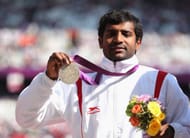There’s no doubt that as compared to the Olympics to the 20th century, India’s performance at the Summer Games in the 21st century has been much improved. But among all the medals that we won in those 2 previous 2 Olympics, none of them was achieved in the track-and-field category.
Despite that, though, there’s no denying that India have definitely had some fine track-and-field athletes, who have done very well in other major events in the world.
Here’s a look at Top 5 Indian track and field athletes of all time:
1.PT Usha
The Payyoli Express, PT Usha was first spotted by coach O.M. Nambiar in 1979 who saw her take part in the National School Games. He then took her under his wing and after a relatively slow start, where he failed to make an impact at the 1980 Moscow Olympics, the Kerala-born athlete came into her own in the subsequent games.
She first tasted success at the 1982 Asian Games, that were held in New Delhi, winning a silver medal in the 100m and 200m event and a year later, won her maiden Gold medal at the Asian Track and Field Championships, that were played in Kuwait in the 400m and also created a new Asian record.
The following year, Usha participated in her second Olympic Games, in Los Angeles, where she first finished first in the 400m hurdles semifinals, but heartbreakingly, missed out on an Olympic medal by 1/100th of a second to finish fourth in the finals.
At the Asian Track and Field Championships, that were held in Jakarta in 1985, Usha won an exceptional 6 Gold medals, which is a record for the most medals won by an athlete in a single international meet.
At the 1986 Asian Games in Seoul, Usha won 4 Gold medals, one each in the 200m, 400m, 400m hurdles and 4x400m relay event and also clinched a Silver medal in the 100m.
Usha took a 2-year break from athletics in 1991, following her marriage, but returned to action in 1993. She was part of the 4x400m relay team at the 1996 Olympics in Atlanta but didn't compete. Later on, she was part of the 4x400m team, that won Gold at the 1998 Asian Championships and also set the current national record of 44.43 seconds.
In a stellar career that lasted close to 15 years, Usha won an astounding 101 medals and for her outstanding achievements in the sport, she was awarded the Padma Shri in 1984. Ever since retiring from the sport, she has shifted her focus to coaching at her training academy in Kerala and has played a key role in development of several promising athletes, that include the likes of Tintu Luka.
2.Milkha Singh
Milkha Singh first came into the athletics scene at the 1956 Melbourne Olympics, where he took part in the 200m and 400m category, but the real turning point in his career, came not on the running track but off it, when he got an opportunity to meet Charles Jenkins, who won the 400m event at those Games.
2 years later, a rejuvenated and much-improved Milkha set records in the 200m and 400m categories at the National Games, that were held in Cuttack and then went on to win the Gold at the Asian Games that year in Tokyo.
The year 1958 became better for him when he won independent India’s first ever Commonwealth Games Gold in the 400m event with a timing of 46.6 seconds.
However, heartbreak for Milkha came 2 years later at the Rome Olympics, where, despite putting in an exceptional performance in the 400m, he missed out an Olympic medal by the skin of his teeth. His performance in the race can be best described by a statement in an Australian newspaper in 2006, that read,
"Milkha Singh is the only Indian to have broken an Olympic track record. Unfortunately he was the fourth man to do so in the same race"
Milkha though didn't let that defeat deter him one bit as he went on to went on win Golds in the 400m and the 4x400m relay. At the 1964 Olympics in Tokyo, Milkha entered to compete in the 400m, 4x100m and 4x 400m events, but didn't participate in the first 2 events and in the 4x400m relay team event finished fourth in the heat stages, along with Makhan Singh, Amrit Pal and Ajmer Singh and they were eliminated at the heat stage.
Following his win over Abdul Khaliq in a race in 1960, Pakistan’s General Ayub Khan called Milkha The Flying Sikh in his post match comments and that nickname has stuck with the athlete ever since.
3.Vikas Gowda
Vikas Gowda first burst on the scene at the 2002 World Junior Championships in Jamaica, where he finished 12th in Discus Throw and 8th in the Shot Put.
But the turning point in Gowda’s career came when he moved to Maryland in the United States and his growth as a discus thrower began when he clinched the 2006 NCAA National Championship title.
In his maiden Commonwealth Games appearance, Gowda finished 6th in the Discus throw and 5th in the Shot Put and in the Asian Games, the very same year, again finished in the 6th position.
Gowda didn't have a great time in his maiden Summer Games in Beijing in 2008 whereHis breakaway performance at the international stage came when he clinched the bronze at the following Asian Games in Guangzhou in 2010, with an effort of 63.13m and then backed that performance up with a even better show at the 2010 Commonwealth Games, clinching the Silver medal with a throw of 63.69m.
In the Asian Championships, that followed next year, Gowda won yet another Silver medal but in the very same year, he had a disappointing World Championships, finishing 7th with an effort of 64.05m.
Gowda suffered back-to-back disappointments at the Olympics when he finished in the 8th position in London in 2012, but the Asian Championships in Pune were back to his rescue the following year as he clinched a Gold with a performance of 64.90m
He carried forward his good show at the Commonwealth Games in Glasgow last year, winning the Gold once again, with an effort of 63.64m, thereby becoming only the second athlete after Milkha Singh to win an individual medal at the Games.
In the Asian Games that followed in Incheon, Gowda won yet another medal, this time a silver with an effort of 62.58m. He recently won yet another Gold at the Asian Championships, that were held in Wuhan, China with an effort of 62.03m
Having tasted success at almost every level of competition, Gowda will be hoping that he can secure the Olympic medal in Rio next year and fulfill any athlete’s most sought-after ambition.
4.Anju Bobby George
Anju Bobby George began her career initially in the Heptathlon event before shifting categories to Long Jump. She first came onto the scene in the Delhi Junior Asian Championships in 1996 where she won a Gold in the Long Jump category. 3 years later, she set the national record in Triple Jump at the Federation Cup, that was held in Bangalore and then won the Silver medal at the South Asian Federation(SAF) Games in Nepal.
In 2001, she beat her own record in the Long Jump, with a performance of 6.74m at the National Circuit Meet in Thiruvananthapuram. She continued her fine run in 2001, by winning the Gold in Triple Jump and the Long Jump at the Ludhiana National Games.
A year later, she won the Bronze medal at the Commonwealth Games in Manchester with an effort of 6.49m and then backed that performance with a Gold in the Asian Games in Busan.
2003 saw her create history when she became the first Indian athlete to win a medal at the World Championships when she won bronze in Paris with an effort of 6.70m. She also achieved her personal best in her first Olympic appearance in Athens in 2004, with a jump of 6.83m, that saw finish at the sixth spot. Incidentally, 11 years later, this is still an Indian national record.
She continued her good form in 2005, winning the Gold at the Asian Athletics Championships in Incheon and the won another Gold at the IAAF World Athletics Final in the very same year with a leap of 6.75m.
She clinched the Silver medal at the Doha Asian Games in 2006 and then won another Silver at the Asian Athletics Championships,which also helped her to qualify for the World Championships in Osaka in 2007, where she finished 9th.
She began her season in 2008 with a Silver medal at the Asian Indoor Championships and then went one better at the South Asian Athletics Championships in Kochi, where she won Gold.
For her stupendous achievements, she was awarded the Arjuna Award in 2002-03 and following her fine performance at the World Championships in 2003, she was also awarded the Rajiv Gandhi Khel Ratna as well.
5. Girisha Nagarajagowda
Born with a disability in his left leg, Girisha Nagarjagowda won a Silver medal in the men’s high jump F-42 category at the 2012 Paralympic Games that were held in London.
The 27-year-old scaled a height of 1.74m using the scissors technique, and courtesy that effort became the 8th Indian to win a medal at the Paralympics.
2012 brought few more laurels for the Girisha as he secured Gold at the Para Athletics Championships that were held in Kuwait and also won a Silver medal at the Para Athletics Championships.
For his achievements, Girisha was awarded the Padma Shri in 2013.




